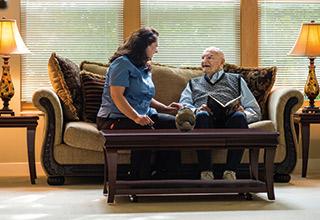Moving to Assisted Living: When’s the Right Time?
While moving is a personal decision, some signs can indicate that assisted living is a good fit for you or a loved one.

“My mom is able to live independently because she’s in assisted living.” Those are the words hanging on the bulletin board in my office, said to me by the daughter of a resident living at NewBridge on the Charles in Dedham, MA.
As we age, there often comes a time when some extra support becomes helpful. If that’s the case right now for you or an older loved one, an assisted living community might be a good option, as it offers an independent life with a little extra attention.
But what are the signs that it’s time to reconsider your current living situation? Everyone’s circumstances are unique, and there’s no one answer to this question. However, there are some signs that I’ve seen in my many years as a collaborative care advisor at NewBridge on the Charles that can suggest that it might be worth having some conversations about what matters most and how one can live their best life now and into the future.
Assisted living versus independent living
Because independent living residents don’t need much support and can live independently, the communities primarily serve their social needs. Meanwhile, assisted living communities support those who need assistance with daily living activities while empowering residents to live as independently as possible.
Registered nurses are typically on-site 12 hours per day in assisted living communities, and staff members and a registered nurse are always on call for your convenience and safety. Assisted living communities tend to have smaller footprints, meeting residents’ needs right in the building. Memory care assisted living programs are even more intentional in their design.
The cost structure is also different, which you can read about in our detailed blog post about the five differences between independent living and assisted living.
Signs it’s time to consider a move to assisted living
You or your loved one has the right to decide when, if ever, it’s time to move to assisted living. If you’re reading this blog post as a concerned adult child, remember that your parent can make their own decisions, even if you disagree with them. While you can talk with them about your thoughts and opinions, you can’t force them to move.
If you have a health care proxy enacted and are considering moving a parent with cognitive decline to a memory care assisted living community, that advice may not apply to you. Instead, you’re likely working through making a tough decision about what your parent would have wanted and what the best choice is for their care needs.
Regardless of whether you’re making the decision for yourself or are concerned about an older person in your life, here are some signs that can indicate a need for additional care:
- Frequent falls
- Isolation and loneliness
- Wandering and becoming lost
- Burning food regularly, or kitchen incidents involving the fire department
- Missed medical appointments, medication, or meals
- Symptoms of cognitive decline
These signs can open the door to gentle conversations with someone about what matters most to them and what they need to thrive. At Hebrew SeniorLife, we root all our care continuum conversations in the idea of what matters most. If you’re having a conversation with someone in your family, doing the same can help assure them that they aren’t being forced to make a choice they’re uncomfortable with.
Assisted living doesn’t mean losing independence
Even if you’ve realized that additional support would be valuable, you might instinctively dismiss the thought of moving to assisted living. Oftentimes, this happens because of the prevalent myth that assisted living means a loss of independence.
That couldn’t be further from the truth! Within the right community, assisted living truly is just a new private space for you to live in, come and go as you please, and get a little extra assistance with activities of daily living.
Sometimes, people want to make their independent living apartment work even when they show signs of needing extra help. That can mean discussing other forms of additional care, such as hiring an in-home caregiver.
While in-home caregivers are an excellent choice for some people, most agencies require a four-hour minimum for their caregiving shifts. Suppose you don’t need someone in your home for that long every day. In that case, you may feel like you have less independence living in an independent living community with an in-home caregiver than you do living in an assisted living community with occasional check-ins or simple medication support.
Ultimately, it’s about creating an individual plan that honors each person’s dignity and reflects what matters most to them.
One family’s journey of embracing additional support
Jennifer, whose father Bob is a NewBridge on the Charles resident, is very familiar with what it’s like to help a parent transition from independent to assisted living. (Jennifer and Bob’s names have been changed for privacy.) Bob lived in independent living at NewBridge on the Charles for five years before shifting to traditional assisted living and, most recently, memory care assisted living. As a continuing care retirement community, NewBridge on the Charles offers a continuum of care options that support residents’ health needs as they change over time.
When Bob stopped taking advantage of everything there was to do in the independent living environment, not eating as well as he used to, and showing signs of cognitive decline during the pandemic, they started to reevaluate what was best for him to maintain his quality of life.
“I always thought that if we got to a point where my dad needed help, I would hire private assistance. That was really because of my own stigma that I had placed on assisted living,” she explains. After many conversations where she had to grapple with her feelings about her father’s care needs, she came to understand that assisted living made a lot of sense — and Bob agreed.
“I realized that assisted living is an independent community. The idea is that residents in assisted living are as independent as they can possibly be, and they encourage living an independent life, but they have assistance when needed,” says Jennifer. Now living in memory assisted living, Bob is eating more regularly than he was in independent living, thanks to the daily three meals offered. Helpful reminders from staff about programming opportunities have also helped him stay social. “I stopped worrying,” adds Jennifer.
Interested in exploring your options?
Hebrew SeniorLife offers many living options tailored to meet your individual needs. Both independent and assisted living communities offer older adults the opportunity to form social relationships, pursue hobbies and interests, and remain active. Hebrew SeniorLife provides a range of options depending on your or your loved one’s goals and care needs that allow you to feel right at home.
If you’re ready to explore independent or assisted living more, we can help you assess which is best for your needs. Find a service or community online today.
Join Our Community: Subscribe to the Hebrew SeniorLife blog for weekly insights on healthy aging and senior living.
Blog Topics
Learn More
Assisted Living
NewBridge on the Charles Assisted Living in Dedham, MA offers a choice of one-or two-bedroom rental apartments, along with the peace of mind that comes with knowing you have the support necessary to maintain an active lifestyle.





